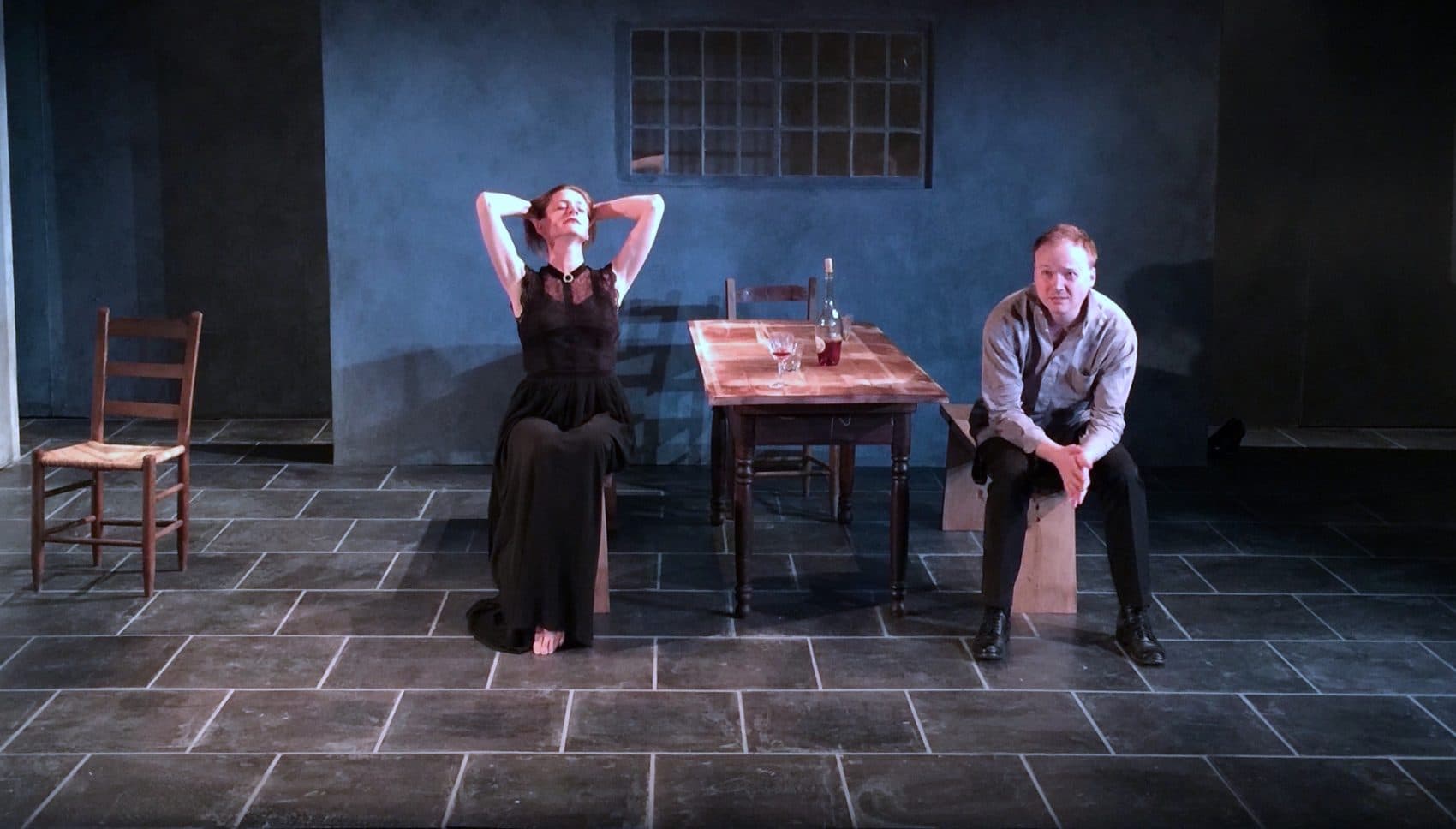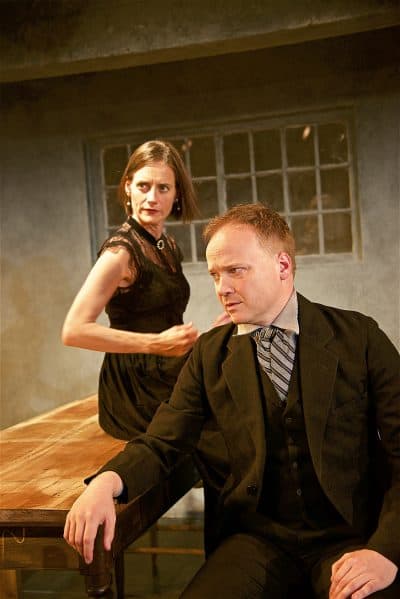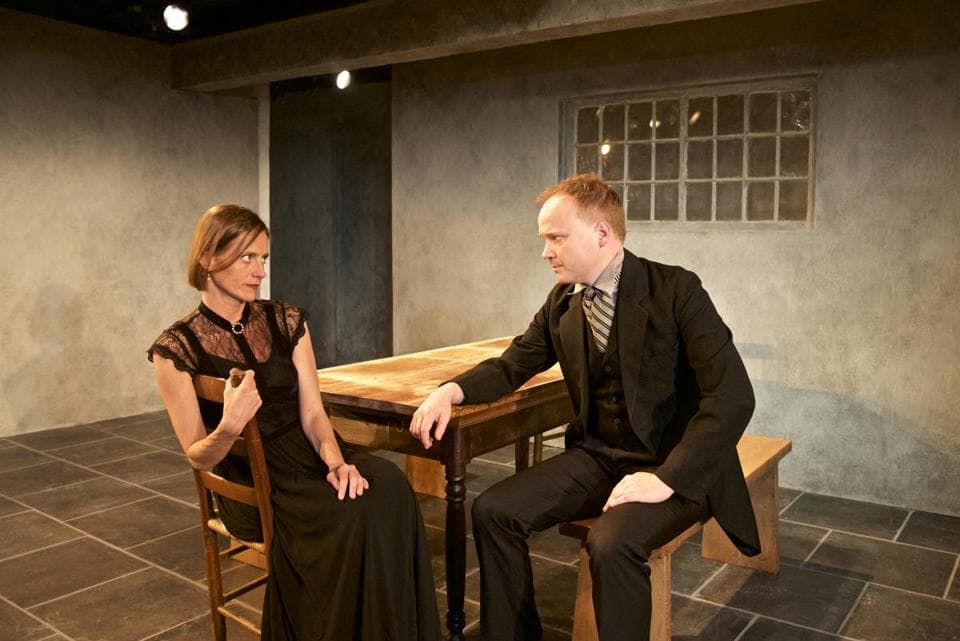Advertisement
You Can't Look Away From This Riveting 'Miss Julie' At The Modern

Harbor Stage Company’s production of “Miss Julie” is like a perfectly tended hothouse garden, with each word accounted for, each gesture carefully weighed and each moment leading to the next with an implied logic that belies these characters’ famously jagged mood swings. Yet it’s not claustrophobic or airless, as that description might imply — or as any interpretation of this material easily could be. It breathes.
There’s nothing particularly showy about the performances, the direction or the design, and I had trouble putting my finger on what exactly made it impossible to look away. But yet, it was.
Director Robert Kropf’s crisply spoken and briskly paced adaptation of August Strindberg’s 1888 drama surely goes a good length of the way, but the production is enlivened by the remarkably natural performances of Brenda Withers as the titular aristocrat, Jonathan Fielding as her father’s valet and Stacy Fischer as Christine, the household cook.

Harbor Stage mounted this production in June and July at its home in Wellfleet, and extends its fifth season with this remount at the Modern Theatre at Suffolk University, playing through Sept. 25. It’s a welcome treat to see the company’s work here; in fact, it augurs well for the new Boston season. One hopes this might be a springboard to a heightened presence in Boston for these artists, all of whom (among the cast and director) are founding members of Harbor Stage. (Kropf is its artistic director.)
The setup is wedded to a particular social context but apt for contemporary updating; ArtsEmerson brought a version set in South Africa to town in 2013. For Strindberg, though, it was the story of a country estate in Sweden, where an upwardly mobile servant and a strong-willed heiress fresh from a broken engagement do an ill-fated dance in which they repeatedly trade dominant and submissive roles, probing the possibilities of a romance that runs contrary to the code that rules their little ecosystem.
As neatly packaged as the action is, this isn’t the easiest material to render successfully for a contemporary audience. Strindberg was a nasty woman-hater, and seems to have written his title character as the embodiment of a woman saddled with the fatal flaw of believing she could be equal to men. (It’s even hinted that her impassioned personality is a side effect of menstruation.) Yet the play is also an early classic of naturalism, with three characters who move worlds beyond the tired character types of melodrama as they balance (or, in some cases, careen between) competing motivations. This is a vividly drawn emotional landscape.

So Miss Julie herself is a rich, deeply conflicted character who must be rendered bracingly but not, one hopes, as a cautionary tale for women who dare to think for themselves. The words flow so freely from Withers’ lips — sometimes in a pained trickle, sometimes a gushing roar — that they seem to be thoughts just freshly occurring to her. It’s hard to play Julie’s ping-ponging affect without making her seem cruelly mercurial. But Withers is so natural, we follow her around each turn, understanding Julie as deeply pained and confused. Even the more portentous, symbolism-heavy lines stuffing the mouths of Julie and Fielding’s valet (called Jon here, Jean in the original text) feel conversational.
Kropf’s adaptation makes use of a simple, kitchen set (by Sara C. Walsh) and skips those boots which Strindberg places onstage as a constant reminder of the looming power of the master of the house. Kropf seems to have tweaked and trimmed the text in ways that feel almost conspicuously contemporary at times, though Withers, Fielding and Fischer work so well with it, only a few moments feel off-key.
What this one-foot-in, one-foot-out-approach — slyly modernizing the piece without a full-on conceptual makeover — doesn’t do is account for the essential thinness of these characters’ ultimate dilemma from a contemporary perspective. Though we understand this is a world rigidly stratified upon class lines, Julie’s impending ruination never feels real (or reasonable) enough to justify the story’s final, dire beats. But we do feel Jon’s desperation and terror as the subservience that’s almost literally been bred into him resurfaces.
Fischer, by the way, is heartbreaking in the moments when Christine senses her mistress is making a play for her sort-of fiancé Jon; Strindberg seems to view Christine as a spinster-in-waiting, but here she feels like the one person who we sense will turn out all right in the end.
In the dour world of “Miss Julie,” that’s pretty darn good. All the more impressive that Harbor Stage’s production is filled with energy, not gloom.
